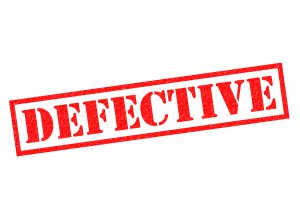The Dangers of Defective Products
 Michael Babboni
Recalls
With so many products on the market today that are used by millions of people, there is always the chance of something not performing as it was intended. Product defects are more common than you may think and can affect anyone.
Michael Babboni
Recalls
With so many products on the market today that are used by millions of people, there is always the chance of something not performing as it was intended. Product defects are more common than you may think and can affect anyone.From home appliances and computers to clothing and cosmetics, many products could potentially have defects which can pose a danger or health risk for consumers.
Injuries stemming from defective products can range greatly from minor injuries to more catastrophic problems that may require more long term treatment.
Liability for Defective Products
Product liability is when the manufacturer or creator of a product is held responsible for any injuries that the product may have caused. The liability not only falls to the manufacturer; however, it also falls to sellers and everyone else who plays a part in the distribution chain for that product.
Product Safety Laws
The Consumer Product Safety Act (CPSA) was enacted in 1972 as a way to protect consumers against the possible risk of injury from consumer products. Consistent safety standards were created, and product safety was evaluated while promoting research to determine why a product may be deemed as unsafe.
The primary reasons we have product safety laws in effect is to protect the public against any unreasonable danger as the result of a defective product, to assist in evaluating the safety of products, and to develop a more uniform safety standard across the board to help minimize state and local product regulations.
Common Safety Claims About Products
While product safety laws exist in each state, these laws also vary state to state. Many of the safety claims stem from a number of reasons besides defective and dangerous products including incorrect food labeling, toxic chemicals, liability issues, and product recalls. Many of these issues are also often the result of some form of negligence.
What Happens When You are Injured by a Defective Product?
Typically, injuries that are sustained due to defective products are addressed in a civil action in court. Most of the time, the result will end in damages being paid to the victim of the defective product in order to compensate them for the injuries they sustained while using the product. The court might also order the manufacturer to follow additional and stricter safety standards and guidelines moving forward.
It is also far easier to prove the fault in a strict liability case in which the products are covered by strict liability laws. After sustaining the injuries, you should seek medical attention first and then enlist the advice of a trusted and reliable attorney to help you file a claim.
What is Strict Liability?
Strict liability is a liability that doesn't depend on any actual negligence or any intent to harm. This means that a person is legally responsible for the consequences stemming from the activity even if there was no fault or criminal intent on the part of the defendant. The definition of strict liability exists in both tort and criminal law.
Hiring an Attorney
If you have been injured due to a defective product, then you may be entitled to compensation. Insurance companies of the manufacturer will often offer a settlement, and many people will readily accept the offer. However, that may not be in your best interest. An experienced attorney will be able to walk you through the process beginning to end to ensure you receive fair compensation.
